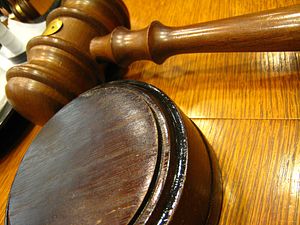As the political fight between Pakistani Prime Minister Nawaz Sharif and opposition leader Imran Khan’s Pakistan Tehreek-e-Insaaf (PTI) unfolds in the streets of Islamabad, there is another war emerging in Pakistan’s courtrooms and bar councils. It was not long ago that lawyers and judges joined hands to create the Lawyers’ Movement for the restoration of democracy, but the relationship between the two groups has become increasingly acrimonious since 2007. As a potential climax to this face-off, several lawyers’ groups (or bar councils) have recently called for the resignation of the chief justice of Lahore’s High Court in response to his suspension of a high-profile attorney’s license to practice law based on allegations of misconduct.
In order to understand the increasingly confrontational relationship between lawyers and judges, one must first understand the role of bar councils in the legal profession in Pakistan. For many common law countries, including Pakistan, the bar council is the gate-keeping institution for lawyers as one cannot practice law without admission into a bar. This gate-keeping function is meant to ensure that the courts and judges are provided with highly-qualified professional attorneys arguing cases before them. The bar councils also control the admission of applicants into the bar, as well as having the right to punish or disbar attorneys for misconduct.
In Pakistan, there are many different bar councils at the national, provincial, and local levels, but none of these councils can be considered monolithic. Each council has its own political, ideological, and personal divisions. The internal divisions among the bar come to the surface during elections for leadership positions on the council, which can result in mudslinging campaigns. The intensity of these elections demonstrates the value of controlling leadership positions in the bar council, because the power derived from these positions has been used in the past to coerce other lawyers or even judges.
This is what allegedly took place in Lahore last month, when the vice president of the Punjab Bar Council was accused of threatening a session’s judge with physical violence. Asad Jamal, an attorney working in Lahore, explains that powerful lawyers often exert undue influence over judges through the imposition of delays and other means of coercion. In response to this environment, the chief justice of the Lahore High Court, a reform-minded jurist named Syed Mansoor Ali Shah, constituted a supervisory committee to adjudicate allegations of misconduct against lawyers. Previously, all such complaints were directed to the Bar Councils to handle internally, but Chief Justice Shah introduced the committee to take immediate and direct action against allegedly misbehaving attorneys.
After its creation, this committee decided to temporarily suspend the legal license of the vice president of the Punjab Bar Council for three months, according to Article 54 of the Legal Practitioners and Bar Councils Act (1973). However, because the bar association is the only institution with the legal power to permanently disbar an attorney, the committee forwarded the case against the vice president to the Punjab Bar Council for further action.
In some countries, a Court taking this extraordinary step would inspire the concerned bar council to conduct investigations and disbar the attorney immediately. However, the Punjab Bar Council reacted defensively by setting aside the Court’s order of suspension, reinstating the lawyer’s license to practice law, and questioning the legitimacy of the Supervisory Committee. This protectionist approach was adopted by other bar councils across the country amid calls for judges to stop interfering in the administration of the bar councils. Many have pointed to the fact that any kind of intervention by the bench into the affairs of the bar councils violates the independence of bar councils.
Some bar council members have demanded the resignation of the chief justice, accusing him of violating established procedures as well as politicizing cases against rivals. In his first few months as chief justice of the Lahore High Court, Shah has faced many critiques and allegations, partly due to his reformist policies. In some ways, the current controversy is less about the bar versus the bench and more about the entrenched elites in the legal profession versus Shah and his campaign for accountability. Shah’s campaign does not stop at attorneys, as he controversially demoted 40 of his fellow judges recently based on allegations of corruption or misbehavior against them.
While there has been a general pushback against Chief Justice Shah’s policies, one cannot underestimate the intensity of the reaction from various bar councils relating to the Supervisory Committee recently constituted by Shah. The confrontational language from many lawyers denotes a widening rift between the bar and bench in Pakistan, which could threaten the legal profession as a whole. While there will always be some disagreements between lawyers and judges, former Justice for the Supreme Court Mian Saqib Nisar once explained that lawyers and judges should enjoy “harmonious and healthy relations” because “both play important roles in the administration of justice…. [and in] maintain[ing] the dignity appropriate to the profession.”
Despite a checkered history, the bar and bench in Pakistan have fought to gain public legitimacy in the last decade. These gains are threatened if the disharmony between judges and lawyers worsens. This could mean that Shah’s attempts to hold lawyers and judges accountable for their misconduct could be turned into a point of such division that the public begins to question the legitimacy of a profession that is plagued with such bitter infighting. At the same time, failure to adopt accountability procedures within the legal community will have a dire impact on the public perception and overall effectiveness of courts and lawyers.
Waris Husain is a professor of law in Washington D.C. and a writer on legal and U.S.-Pakistan issues.

































